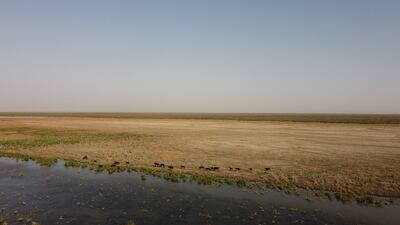Iraq’s marshes, home to the country's famed Marsh Arab culture and a haven for migratory birds, are under threat from climate change, water scarcity and increasing water salinity, the United Nations said on Tuesday.
The marshlands of Iraq are regarded by many as the home of the biblical Garden of Eden, and previously faced destruction at the hands of dictator Saddam Hussein, who drained the area after it became a haven for anti-government rebels.
The unique wetlands are now jeopardised by poor wastewater management and climate change, one of the worst affected areas in the country.
“The marshlands are not only magnificent landscapes, they are also essential for Iraq’s biodiversity. While Iraqi authorities express their commitment to tackling climate change challenges, ownership across the political spectrum will prove essential,” the UN envoy to Iraq, Jeanine Hennis-Plasschaert, said in a statement.
“Water scarcity is a threat multiplier, adding to poverty, displacement, instability and conflict. These risks will only be exacerbated in the absence of concerted action and political resolve,” Ms Hennis-Plasschaert said.
Iraq’s 2020-2021 rainfall season was the second driest in 40 years, causing the salinity of the wetlands to rise to dangerous levels.
Salinity occurs naturally in surface water but can accumulate quickly in hot climates when there is not enough rainwater to wash it away, reaching levels that can leave soil barren.
The UN said that annual evaporation varies from 2.5 to 3 metres, sharply reducing river flows supplying the marshlands, resulting in their area being substantially reduced.
Moreover, increased salinity and mineral concentration directly affect human and animal health, it said.
The international body called for "urgent action to address the lack of potable water and associated risks, including forced displacement".
The sites that are severely affected are the Ahwar of Southern Iraq, which is a World Heritage Site as well as being classed by the UN as a Refuge of Biodiversity and the Relict Landscape of the Mesopotamian Cities.
"These sites, closely associated with the country’s ancient history and rich culture, are highly vulnerable and require conservation to prevent further irreversible erosion and collapse," the UN said.
In 2019, The UN Environment Programme (Unep) said that "climate change in Iraq is expected to reduce annual rainfall, which will lead to a surge in dust storms, a reduction in agricultural productivity and increased water scarcity".
Aside from the threat to agriculture, domestic water supplies are also under severe threat. Iraqis had 2,100 cubic metres of water available per person, per year in 2015, Unep said, but that by 2025, this figure will have fallen to 1,750.
This will risk a repeat of the kind of crises seen in Basra in 2018 when as many as 100,000 people were sickened by polluted tap water, a crises that experts said was partly due to falling water levels in the Shatt Al Arab, Basra's main source of freshwater.
It also poses a threat to industrial development in the country, endangering the livelihoods of its 40 million people.


